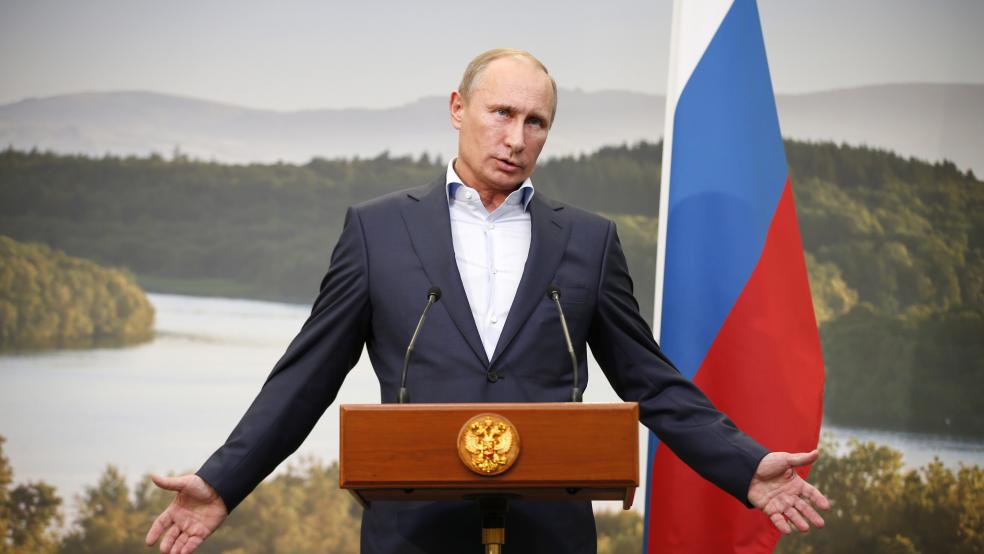Russia and Ukraine inched closer to all-out war Saturday, with Ukraine threatening to blockade the eastern city of Slovyansk, which is now under the control of pro-Russia activists. The Pentagon also confirmed that Russian war planes made numerous incursions into Ukrainian air space, while foreign military observers from the Organization for Security and Cooperation in Europe (OSCE), along with their Ukrainian hosts, were imprisoned in Slovyansk.
The maneuvers by Russian troops along the Ukrainian border and Russia’s continued aggression toward the country prompted the G-7 to announce new sanctions against Russia last week.
Related: How Obama’s White House Lost Ukraine in a Few Stupid Steps
“We have now agreed that we will move swiftly to impose additional sanctions on Russia," the G7 leaders said in a statement released by the White House Friday. “Given the urgency of securing the opportunity for a successful and peaceful democratic vote next month in Ukraine's presidential elections, we have committed to act urgently to intensify targeted sanctions and measures to increase the costs of Russia's actions.”
It remains to be seen, though, if the new sanctions, which could target the energy sector and cause pain to the Russian economy, would be enough to stop Russian President Vladimir Putin. So far, in the face of steep losses to the ruble and the Russian stock market, he has yet to blink.
If anything, he’s been more defiant of the West as the Ukraine crisis evolves. When Russian troops invaded Crimea, he was at least willing to engage with the West. Now, he’s simply ignoring international deals and is letting his foreign minister, Sergei Lavrov, take the lead in dealing with Europe and the United States.
Related: World Leaders Mull More Sanctions as Markets Punish Putin
Perhaps Putin’s besting of the United States vis-a-vis other international incidents, such as with Edward Snowden’s spy revelations and with the Syrian civil war, have emboldened the one-time KGB agent. The deadline for Bashar al-Assad to get rid of his chemical weapons stockpiles is today, and it appears as if he will meet that. But as Assad gives up his sophisticated chemical arms, there are new reports that bombs filled with chlorine - a rudimentary chemical weapon - are being dropped from Assad’s helicopters and airplanes.
White House Gives Up
The White House has “written off” dealing with Putin directly, a Newsweek report claims, with an administration official saying there’s “no point in trying to reach him directly.”
That suggests that the White House’s strategy is to try to bankrupt Russia through economic sanctions and to freeze the assets of the oligarchs who back Putin. But that process will take time, and the speed with which Putin has mobilized against Ukraine suggests that the country could be his before sanctions cause enough damage to deter him.
The Obama administration has already taken the use of force off the table. Putin knows that he could roll tanks across Ukraine’s border this evening and that the United States and its NATO allies would not act to stop it. That would lead to a proxy war between the West and Russia, with the Ukrainian military receiving supplies from NATO.
GOP Critics Grow Louder
Obama’s refusal to commit troops to Ukraine has led to criticisms of weakness from many Republicans. When State Department spokesperson Jen Psaki tweeted, “The world stands #UnitedforUkraine. Let’s hope that the #Kremlin & @mfa Russia will live by the promise of hashtag,” Sen. Ted Cruz blasted the Obama administration.
Related: How Europe Could Finally Call Putin’s Bluff
“Note to the State Department: ‘The promise of a hashtag’ isn't going to make [Russian President] Putin pull out of Ukraine,” Cruz tweeted Saturday.
John McCain, John Barrasso, John Hoeven and Ron Johnson leveled the same criticism. The Republican senators recently traveled to Estonia, Latvia, Lithuania and Moldova, all former Soviet bloc states that fear invasion by Russia. The senators criticized the president for showing weakness toward Putin and accused Obama of emboldening the Russian president. They also urged the United States and NATO to completely cut all relations with Moscow.
“Putin will not compromise his quest to dominate Russia’s sovereign neighbors (not least as a cynical way to build support at home for his corrupt and autocratic rule),” the lawmakers wrote in The Washington Post. “He may play along with Western diplomats eager to avoid conflict, as happened recently in Geneva, but only as a way to consolidate his gains, divide the United States and Europe, play for time and prepare to push further.”
They also wrote: “Western weakness emboldens Putin. The only thing he respects, and that can change his calculus, is greater strength.”
Top Reads from The Fiscal Times:





